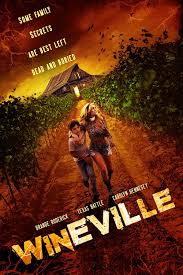
Brande Roderick’s Wineville is a chilling indie horror-thriller that blends psychological tension with visceral fear. The film follows Tess, a single mother who returns to her family’s vineyard to settle her late father’s affairs. But as she unearths long-buried secrets, she finds herself entangled in a web of terror where past horrors refuse to stay buried.
Roderick, both director and lead actress, brings a commanding presence to the screen. Her portrayal of Tess is layered—equal parts vulnerability and determination—as she faces mounting dread. Carolyn Hennesy’s performance as Aunt Margaret is equally compelling, adding a sinister undertone to the unraveling mystery. Casey King delivers a strong performance as Joe, a character caught in the storm of Tess’s unraveling world.
Set against the eerie backdrop of a 1970s vineyard, Wineville embraces a vintage grindhouse aesthetic. Its unsettling atmosphere is heightened by eerie cinematography and a deliberately paced buildup, culminating in moments of raw, unrelenting horror. While some dialogue lacks finesse, the film compensates with gripping tension and gruesome imagery that lingers long after the credits roll.
Buried Trauma and the Inescapable Past
At its heart, Wineville explores the lingering effects of trauma—both personal and generational. Tess’s return to the vineyard is more than just a practical decision; it’s a reckoning with a history she barely understands. As the film unfolds, the vineyard becomes a symbolic battleground where past horrors manifest in terrifying ways. The story suggests that trauma, especially when suppressed, doesn’t simply disappear—it festers, waiting to be unearthed.
The Horror of Legacy and Bloodline
Another gripping theme is the idea that family legacy is both a source of identity and an inescapable curse. Wineville crafts a chilling narrative around the sins of ancestors, posing a dark question: Can we ever truly break free from the past, or are we doomed to repeat it? Tess’s journey is not just about survival—it’s about confronting the eerie truth that some inheritances bring more than wealth or tradition; they carry consequences that transcend generations.
Isolation and Psychological Decay
The setting—a sprawling, yet eerily desolate vineyard—mirrors Tess’s growing isolation. The emptiness of the land amplifies the sense of entrapment, making it feel like Tess is slowly being consumed by forces beyond her control. As she unravels the truth, the horror intensifies, blurring the lines between psychological paranoia and tangible fear. Is the terror external, or is it manifesting from within? Wineville skillfully keeps viewers questioning until its chilling climax.
The Seduction of the Unknown
Throughout the film, there’s an unsettling allure to the mystery surrounding the vineyard. Secrets are intoxicating—like the wine it produces. This theme parallels classic horror storytelling, where curiosity often leads to destruction. Tess’s determination to understand her father’s past drives her deeper into an abyss that might have been best left undiscovered.
The film’s themes come together to craft a slow-burning nightmare that lingers beyond the final frame.
Favorite Scene Breakdown: The Cellar Revelation
As Tess enters into the dimly lit cellar, the atmosphere shifts from eerie suspense to full-blown psychological horror. The walls are lined with old wine barrels, but as she moves deeper, she discovers something far more disturbing—hidden compartments filled with relics from her father’s past. Faded photographs, bloodstained tools, and cryptic journal entries hint at a history of violence and secrecy.
This scene is a visual metaphor for Tess’s journey. The cellar represents the depths of her subconscious—the memories she has suppressed for years. As she uncovers each item, fragmented flashbacks begin to overwhelm her, revealing glimpses of her childhood trauma. The film cleverly uses sound design here: distorted whispers echo through the room, blending with the creaking wood and dripping water, reinforcing the idea that the past is alive and clawing its way back into her reality.
Themes Reflected in the Scene
This moment is a turning point in the film, pushing Tess toward the realization that escaping the vineyard won’t be enough—she must face its ghosts.
For horror fans who enjoy psychological depth mixed with classic genre tropes, Wineville is a worthwhile watch—an unsettling journey into fear, legacy, and the ghosts we can never truly outrun.